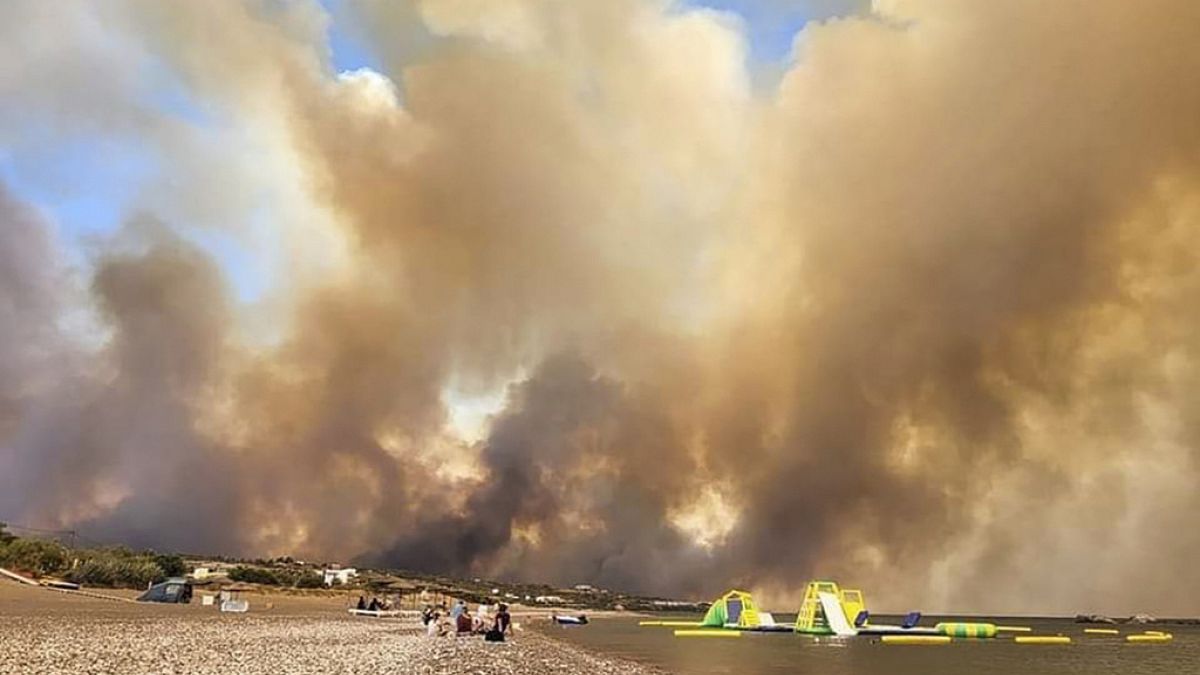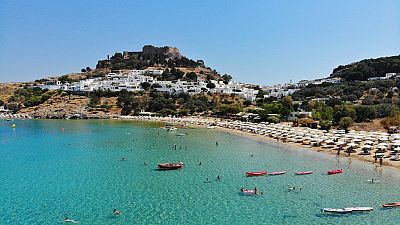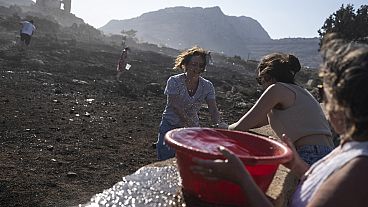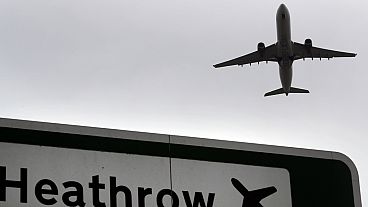It is not safe to travel to some areas of Greece as climate change-related wildfires devastate tourist regions.
Rhodes has been forced to carry out further evacuations in the south of the island as a wildfire continues to rage.
Over the weekend, 19,000 people - mostly tourists - were evacuated from the Greek resort island in the country's largest ever evacuation. Wildfires have been burning on the island for the last seven days, fuelled by strong winds and successive heat waves.
Those brought to safety came from 12 villages and several hotels. No casualties have yet been reported, although people are being hospitalised with respiratory problems.
Evacuations were also ordered overnight on the western island of Corfu, where more than 2,000 people were moved to safety by land and sea, as well as on the island of Evia and in a mountainous area in the southern Peloponnese region.
In Greece, an average of 50 new wildfires have broken out daily for the past 12 days, according to government spokesperson Pavlos Marinakis. On Sunday, 64 new blazes were recorded.
Read on for everything you need to know about travelling to Greece right now.
This article will be updated as the situation develops.
Greece evacuations: How can tourists get off Rhodes and Corfu?
As this is an emergency situation, communications and information are limited. However it seems that tourists are being helped directly at airports.
It has been reported that if travellers do not have their passports after being forced to flee at short notice, they will be assisted at airports and ports by officials from the Greek Foreign Ministry, embassies and diplomats.
The majority of tourists in Corfu and Rhodes are British so the most flights are needed to the UK.
A British Foreign Office spokesman confirmed a Rapid Deployment Team had arrived on Rhodes to support travel operators in bringing Britons home. They say, “British nationals in Rhodes should contact their travel operator in the first instance for any queries regarding the rescheduling of flights and continue to check our updated gov.uk travel advice for information.”
The army was helping to set up temporary accommodation on Rhodes, where schools and sporting facilities were opened to help with the effort.
EasyJet operated two rescue flights from Rhodes totalling 421 seats on Monday and will lay on a third on Tuesday 25 July.
The Czech Republic has also arranged repatriation flights to Prague.
Rhodes and Corfu: Airlines and travel companies cancel flights and holidays
British airline Jet2 has issued a statement saying all flights and holidays to Rhodes are cancelled until 30 July. The full statement is below.
European travel company Tui has scrapped all flights and holidays to the island up to and including 28 July, and until 30 July for areas specifically affected by the fires.
Those due to fly out with Tui on Wednesday are being offered the option to take an alternative holiday without amendment fees or a full refund if they opt to cancel.
A Tui UK and Ireland spokesperson said: “We’re now working hard to get everybody home safely with our first passengers returning to the UK on three dedicated flights overnight and plans in place to get everyone affected back as soon as possible.”
Tour operator Thomas Cook has cancelled all holidays to Kiotari and Lardos - the areas of Rhodes most at risk - until 31 July and says it will be in touch with customers to arrange “swift refunds”.
EasyJet has cancelled package holidays until 29 July and operated two repatriation flights on Monday and a third on Tuesday to bring British holidaymakers back to London Gatwick Airport.
British Airways is continuing to operate flights to help get passengers home from Rhodes, with a larger aircraft being deployed on Monday night to accommodate those wanting to return early.
Loveholidays has cancelled all holiday departures to Rhodes on Sunday and Monday.
'Extreme fire risk' warnings: Where is it unsafe to travel to?
Extreme fire risk warnings are in place for:
- Attica
- Evia
- Boeotia
- Corinthia
- Ilia
- Argolis
- Messinia
- Rhodes
Greek authorities have stressed that the affected areas in Rhodes represent “less than 10 per cent of the total tourist capacity” on the island.
The UK government has not advised against travel to Rhodes but urges tourists to follow guidance from the Greek emergency services and check with their hotel and airline before travelling.
Due to this, travel insurance might not cover the cost of cancellations, unless it includes an add-on to cover natural disasters.
The situation in Corfu is not thought to be as serious as in Rhodes. However people in the settlements of Santa, Megoula, Porta, Palia Perithia and Sinies have been ordered to leave.
How long could the wildfires continue for?
The main front of the fire is a triangle, with two of its points near the sea and one in the mountains. On maps, each side of the triangle appears more than 10 kilometres long.
The blaze in Rhodes was just one, the most dangerous, of several active across Greece.
A fire northwest of Athens and one near Sparta are subsiding, although the conditions, including temperatures which reached 45C on Sunday and low humidity (below 15 per cent), mean that the danger isn't over and more wildfires might break out.
There was a brief respite in the heatwave on Monday, but temperatures on Tuesday have reached 35C. Cooler weather is expected on Thursday.
Firefighting forces from eight European Union countries are helping to contain the fires. Israel, Jordan and Turkey have also sent reinforcements, mostly aerial equipment.



